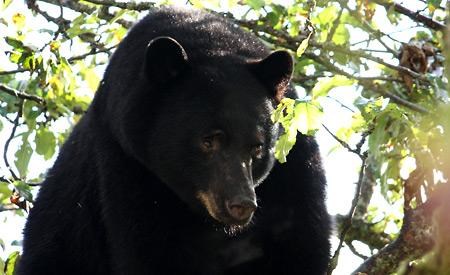With bears seeking non-natural food sources, BC Environment Minister Terry Lake is spreading the word to British Columbians to do what they can to control bear attractants and reduce conflicts with bears.
The main cause of human-wildlife conflicts in BC is access to easy food sources. Bears that learn how to get at exposed pet food, ripe fruit, improperly stored garbage, dirty barbecues or composts, become conditioned and will continue to return to the area.
Powell River Conservation Officer Andrew Anaka knows all too well the reasons bears frequent the community. Mostly, the bears are drawn by backyard attractants. However, chickens and other fowl also attract bears. “The Powell River Conservation Officer Service has already received a number of calls regarding problem black bears in the community,” he said. “Several of these calls are regarding the killing of chickens.”
A new brochure has been created to help owners of fowl keep their birds safe from bears and other predators. The brochure is available outside the conservation officers’ office, on the lower level of the government services building, 6953 Alberni Street.
People are encouraged to prevent human-bear conflicts by adopting the following practices:
· Keep garbage secured in a bear-resistant container or in the house, garage or shed until pickup day and return the containers to the secure site once they are emptied.
· Pick ripe and fallen fruit daily.
· Use bird feeders only in winter.
· Keep the ground free of seeds and nuts.
· Clean the barbecue grill after each use and store it in a secure area.
· Bring pet food and dishes inside.
· Do not add meat products to compost. Turn compost regularly and keep it covered.
· If residents spot a bear, remain calm, keep away from the bear and bring children and pets indoors, if possible.
· Never approach a bear and do not run from it as bears can move very quickly.
· Once the bear has left the area, residents should check their yards to ensure no attractants are available.
Conservation officers are the primary responders to human-wildlife conflicts where there is a risk to public safety, conservation concerns or where significant property damage has occurred. Recent changes to the Wildlife Act give the officers the ability to issue a $230 ticket or notice for a court appearance to residents who do not secure attractants. Residents who intentionally leave out items that attract dangerous wildlife could also be issued a Dangerous Wildlife Protection Order. Failure to comply with an order carries a $575 fine.
In communities where attractants are managed properly, there has been a decline in related human-bear conflict and the number of bears that have to be destroyed.
In 2011-12, conservation officer service received approximately 37,500 calls regarding human-wildlife conflicts. Of those calls, approximately 23,800 involved bears. Over the past five years in BC, an average of 600 black bears have been destroyed each year, while 93 were relocated.
Bear Aware is an educational program, managed by the British Columbia Conservation Foundation, that is designed to reduce conflicts between people and bears.
In areas with high incidences of human-bear conflict, residents can learn more about avoiding conflict by talking to their local Bear Aware program volunteers. For Powell River, the person to contact is Laurence Edwards at 604.483.2334 or 604.223.1170 or visit the program's website.
The public is encouraged to report human-wildlife conflicts that threaten public safety or result in significant property damage by calling the Report All Poachers and Polluters (RAPP) line, toll-free at 1.877.952.7277, or visit the RAPP website.



